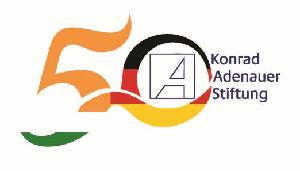FICCI–KAS Dialogue Series: Dialogue II - Rule of Law - Foundation Office India
Event Reports
More extensive legal cooperation could benefit both countries, all speakers agreed at the second FICCI-KAS dialogue series in New Delhi. The conference focused on the subject of intellectual property rights, a particularly important area for the German-Indian business and trade relations. Its content refers to intangible rights such as patents and trademarks. Narendra Sabharwal, chairman of the FICCI IPR Committee and former Deputy Director-General of the World Intellectual Property Organization (WIPO), stated right from the outset that, despite the great need, there has been no platform for legal exchange between lawyers in both countries. Admittedly, numerous committees have existed so far, for example for questions relating to technological exchange or industry policy. However, an exchange on the legal foundations has not yet taken place. Intellectual property rights are a key requirement for economic exchange. With the creation of the „Indo-German Association for Legal Cooperation (IGAL)“, a platform has been created that brings together all stakeholders in this field to achieve a sustainable progress in the Indo-German cooperation on legal issues.
Mr. Christian Hirte, Parliamentary State Secretary at the Federal Ministry for Economic Affairs and Energy, emphasized the potential of German-Indian cooperation in legal matters in strengthening the cooperation in the economic sector. He also praised the commitment of the former Resident Representative of the Konrad-Adenauer-Stiftung's India office, late Dr. Lars-Peter Schmidt, and emphasized the commitment of the current Resident Representative Peter Rimmele for the Indo-German dialogue. The work of recent years is now bearing fruit on this evening by the launch of IGAL in India, he declared. The forum is intended as a platform for a dialogue between lawyers, judges, politicians and investors of both countries in order to exchange ideas and make personal contacts. Justice Prathiba M. Singh, judge at the Delhi High Court, outlined the importance of intellectual property for contemporary politics. While in the past wars were still carried out over land, sea or religion, contemporary conflicts are often viewed as non-violent disputes over trade, customs and intellectual property. Thus, the US government justified its recent punitive tariffs on China, among other things, by alleged forced transfers of intellectual property that American companies in China would have to face before entering the Chinese market. For the negotiation of a free trade agreement between the EU and India, this area of law has also been an obstacle. In times of weakening multilateralism in the international order, bilateral cooperation between Germany and India is therefore an important step on a still very long road to free trade. Justice Singh also presented to the plenary a series of recommendations that could accelerate this development.
The Indian lawyer and spokesperson of the ruling Bharatiya Janata Party, Nalin S. Kohli, emphasized the friendly connections between the countries and especially among the initiators of IGAL. He saw the intensification of the exchange on legal issues as a way to sustainably strengthen the Government's "Make in India" campaign and bring some of the German culture of middle-class family businesses to India.
Dr. Jasper Wieck, Deputy Chief of Mission at the German Embassy in India, joined his previous speakers in advocating an intensification of legal cooperation between the two countries. He emphasized that due to its low natural resources, Germany relies heavily on the intellectual property and innovative potential of its population, while India, as a rapidly growing economic market, has a particular interest in foreign investments. Therefore, a common platform between the two countries is essential for intensified economic exchange. Furthermore, he pleaded that in India, people should identify with the foreign companies which have made India a base for their manufacturing and should perceive them as Indian and not as foreign countries. For example, a car produced in India by the establishment of a German company is a product of Indian engineering, whose proceeds also benefit the Indian people directly through taxes.
In the second part of the event, lawyers from both countries gave the audience brief insights into various topics of law. Dr. Holger Jakob presented the relationship between international, national law and EU law in Germany and identified fields in which both countries could enter into dialogue in the relevant area of law. Dr. Arghya Sengupta, Founder and Research Director of the Vidhi Center for Legal Policy, explained to the audience how both the Indian Constitution and the German Constitution protect themselves. Hardy Herbert, accountant and lawyer, outlined the importance of trust as a basis for doing business, highlighting the importance of trust in the legal system as a key factor. Finally, Neeti Sachdeva, Secretary-General of the Mumbai Center for International Arbitration (MCIA), explained to the audience the importance of arbitration, which is usually necessary if there is disagreement between the contractors involved. She explicitly requested an own Arbitration Court of the World Intellectual Property Organization (WIPO) for India, as all Indian cases so far had to be decided abroad in the absence of such an arbitral tribunal.
Finally, Peter Rimmele, Resident Representative of the Konrad-Adenauer-Stiftung in India, thanked all participants and emphasized the commitment of Christian Hirte and Nalin S. Kohli as well as the German and Indian partners for the joint project IGAL.
Topics
Fico pushes through controversial criminal law reform - and thus unites the opposition
Senegal's democracy passes the stress test
Between dialogue and resistance The conflict on the final word in the European judicial order
Ecuador: Muerte Cruzada Keeps President Guillermo Lasso in Office
Nach der Reform ist vor der Reform

















